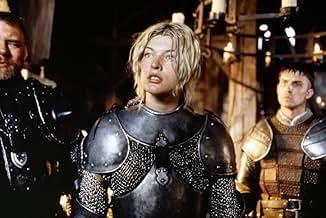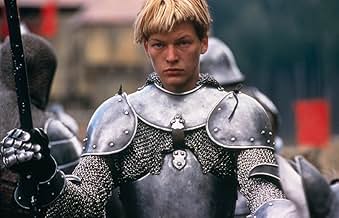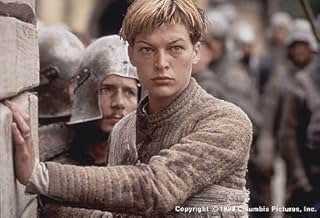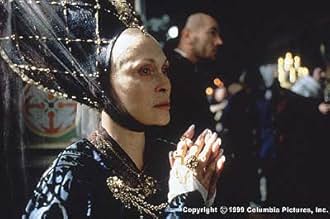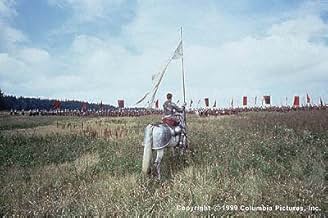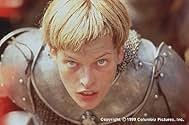Une jeune fille a une vision qui la pousse à bouter les forces occupantes hors de France.Une jeune fille a une vision qui la pousse à bouter les forces occupantes hors de France.Une jeune fille a une vision qui la pousse à bouter les forces occupantes hors de France.
- Réalisation
- Scénario
- Casting principal
- Récompenses
- 5 victoires et 13 nominations au total
- Look Out
- (as Stephane Algoud)
Avis à la une
But sadly it is flawed. Much to my chagrin, as I do admire most of his work, Dustin Hoffman's performance is, to put it mildly, a big downer for the film. He is clearly at a loss as to what his character or purpose is in the film. His performance is uncomfortable and distracting. Despite his lower appearance in the credits, his role was critical in the film. It's a real detractor. But aside from this one glaring flaw, the film is of the highest quality on all accounts. I was riveted from beginning to end and wouldn't hesitate to watch it again. Because of it's one casting/directing flaw I have to rate it an 8 but on every other count it's a 10.
Joan was, of course, the deeply devout, illiterate peasant girl who, spurred on by what she claimed were visions and voices sent directly by God - assuring her and France of a glorious victory over the advancing forces of the invading English army - managed to convince a desperate monarch to have her lead an army into the field, despite the fact that she brought with her no previous battle experience or even a rudimentary knowledge of the use of weapons in combat. We first see her as a young girl, strangely obsessed with religious piety, attending confession daily, running through the woods in a mad frenzy of ecstasy, encountering strange, inexplicable visions along the way, and, eventually, being driven to an intense hatred of the British by the rape and murder of her beloved older sister. We see the French royalty, so driven to desperation by the seemingly inexorable encroachment of the brutal British onto their native soil, that they lend credence to this child and give in to her demands, sending her out to lead the troops into what turns out to be some truly miraculous routs and victories. But glory is, more often than not, an ineffable entity that is lost as quickly as it is gained and Joan learns tragically that, once her original goal of restoring the French monarch to his throne is achieved, her services are no longer of value, and she is allowed to be captured by the English, tried by the Catholic Church, and burned at the stake by the English government for the crime of witchcraft.
Given this fascinating and astonishing series of events, it would be difficult to make a film completely lacking in interest and insight. And, indeed, `The Messenger' is, perhaps, a better film than many of the harsh, almost bitter reviews by many critics would indicate. The first half of the film is a rather conventional telling of the tale. The warrior Joan often comes across as a shrill, petulant adolescent who somehow never convinces us that she is, indeed, someone all these military strategists would follow. But, about midway through the film, the screenwriters, Andrew Birkin and writer/director Besson, begin to apply some psychological depth to the character. After a particularly sanguine encounter with the English, in which hundreds of decapitated and limbless corpses strew the blood-soaked ground, Joan breaks down in despair over the horrifying inhumanity of the sight. From then on, her actions arise from a paradoxical conflict occurring within the very core of her being - between the righteousness of her pious cause, the pacifistic teachings of Christ and her single-minded devotion to her king and country. When she is finally captured and held in prison before and during her trial, she begins to question the veracity of her visions and to ponder whether the motivation for her cause really lay in divine inspiration or an obsession for personal glory and power. We're a long way from the astute psychological insights of Carl Dreyer's classic silent film version of the story, `The Passion of Jeanne d'Arc,' but `The Messenger' does take occasional time out from its action sequences to attempt to explore the question of whether Joan's miracles were the product of divine intervention or of mere happenstance and chance coupled with a determination and passion borne of insanity. Unfortunately, casting Dustin Hoffman as the Voice of Conscience who visits her in her cell and speaks for the side of reason as she descends more and more into seeming madness, renders much of this otherwise fascinating section faintly ludicrous. Every time his overly familiar face and voice arrive on the scene, we are immediately thrust out of the context of the story and find ourselves tempted to giggle out loud hardly the tone one wants to establish as Joan of Arc marches grimly to the stake. Also, much of what he utters rings false in the context of the film's era; he sounds like he is mouthing psychobabble that would not arrive on the scene for at least another five hundred years.
In terms of dialogue, historical films have always it seems had to face an inevitable Hobson's Choice: should the writers employ language that reflects the reality of the time, thereby making the characters sound stilted or dated by today's standards, or should the authors resort to the use of more modern vernacular, enhancing the immediacy of the story, perhaps, but also possibly creating an uncomfortable and awkward sense of anachronism that weakens the verisimilitude of the film so painstakingly established by the elaborate set decoration and costume design of the film? The writers of `The Messenger' have, for the most part, taken the latter course, leading to mood-shattering declarations by the characters such as `she's nuts!' and `I'm gonna kill that f------ bitch' along with a barrage of four-letter word expletives with which no contemporary PG-13 or R-rated feature could ever do without.
Those with a queasiness when it comes to movie violence had best be forewarned: the battle scenes, though expertly shot and edited, register high on the bloodletting scale.
Of the performers, none matches in quality the exquisite photography, art direction or costume design that adorn the film. Milla Jovovich is, at best, adequate as Joan, rarely giving more than a surface interpretation of the complex psychological struggles occurring at the root of her personality. John Malkovich, as the would-be French king, for whose throne Joan lays her life on the line, has his moments, but the part is not really big enough in the context of the film to allow him to create a multifaceted performance. Faye Dunaway brings a cool, subtle intensity to her role as the future king's manipulative mother-in-law.
`The Messenger' emerges as an ultimately unsatisfying mixture of faults and virtues, yet, because it has such a fascinating story to tell, the film is far more interesting than the brutally hostile reviews that greeted the work's initial release would lead one to believe.
Jovavich's Jeanne is plagued by the difference between her idea of utter submission to God and the consequences of doing so; by doubt over the veracity of her visions; and by the gap between her ideals of the divine rights of kings and realpolitik. She is constantly on the verge of a nervous breakdown - is this a manifestation of her mental illness, or of her "burning for God"? And where's the difference between the two?
The film raises more questions than it answers, and that's as it should be. It is something of a shame that Besson's film takes liberties with the facts as we understand them (though history is more often about our interpretation of events than the events themselves), but in terms of raising important questions on the nature of faith, it succeeds beyond measure.
The picture that Luc Besson made here deserves to be appreciated on its own merits. It is visually stunning, rousingly action-packed, and full of interesting period details. Yes, casting his supermodel wife Milla Jovovich in the lead was a risky choice, as her looks were hardly those of a typical medieval peasant. Yes, her performance did not resonate with the period the way one by a more classically trained actress might, although she was clearly never trying to be Ingrid Bergman. Still, Milla's hyperactive personality made her interesting and watchable as a historical person about whom so much has been written, who nonetheless existed so far back in the past that she lacks a strongly identifiable humanity. When somebody makes a better statue than a person, as Joan does from a contemporary viewpoint, odd casting choices can be forgiven if they work. Milla's twisty mannerisms, rolling eyes and whispery speech give the viewer constant occasions to ponder just how much of Joan's fanaticism came from genuine devotion to God and the church and how much was just an under-medicated personality disorder. This is actually one of the key scholarly issues surrounding Joan's life, and the picture brings it to the fore in its latter part as Joan herself tries to come to terms with her own claims of divine communication by means of a debate with Dustin Hoffman as her confessor-priest/conscience. That Besson takes no particular viewpoint here is an interesting choice, and one which actually helps the viewer to understand why Joan's story has compelled so many generations of historians.
The political aspects of Joan's life and legend were also dealt with in a nicely balanced fashion. Like many figures in times when political and national alliances changed with the seasons, Joan herself blew back and forth between being tremendously useful to the French throne at times and dangerously inconvenient at others. Fame is a powerful commodity at any time, and the picture carefully tracked the rise and fall of Joan's fortunes as she watched hers be manipulated, leveraged and ultimately put on trial.
I thought a lot of The Messenger and recommend it. Religious and historical scholars are advised to approach with caution.
There really was a very religious young girl who was considered a savior to France during The Hundred Years War. Although things may have eventually sorted themselves out the same way without her. Three years after her birth, the new tactics of the English archers were responsible for arguably the most one-sided battle in military history at Agincourt. The result was credited to Henry V's piety and he got a great passage in Shakespeare. The French aristocracy was almost wiped out by the battle and the English became solidly entrenched in France. Fourteen years later a new generation of French nobility was beginning to assert itself and it was the English and their French allies who were having leadership problems.
Both countries were Catholic at the time and both claimed that God was on their side, a bit like the football player who thanks God for the victory over another team that apparently God did not favor.
Although there are records of both of Joan's trials (her Condemnation Trial and her Rehabilitation Trial) both proceedings had their own political agenda and should be taken with a grain of salt. Besson's film seems to follow the generally accepted version of the story but takes obvious liberties with Joan's mental condition and visions. There is no way to prove or disprove any of this so it is probably as plausible as any other speculation.
What hurts "The Messenger: The Story of Joan of Arc" is that Besson's best scenes are at the very beginning and set too high a standard for the remainder of the film. Jane Valentine is wonderful as the young Joan and Besson shows that his directing skills with young actors was not confined to Natalie Portman's performance in "Leon". This early stuff features some of the most interesting scene juxtaposition that you are likely to see in any film. IMHO it gets off to a better start than any film in cinema history. And the sequence where the young Joan is standing on a hill watching as the English burn her village is as visually stunning as anything ever filmed.
But once Milla Jovovich's grown-up Joan takes over most viewers will find it difficult to stay focused on the story. It's not miscasting, Jovovich is noted for aggressive and daring performances (see "The Dummy") rather than subtlety and nuance, making her a good fit for the take Besson wanted on Joan's personality. The problem is that while a viewer could identify with the young Joan, the older Joan is just repellent. Her story should be inspirational and tragic. Instead it is a bunch of comic book battle scenes and comical melodrama.
But it is worth watching for the production design and the beginning sequences.
Then again, what do I know? I'm only a child.
Le saviez-vous
- AnecdotesMost of the characters, including Joan's Captains, were real people. Giles de Rais was a real person who, after the war and Joan's death, retired to his lands. Many years later, he was arrested for the murder of more than 100 young boys, and executed. Some historians believe that his crimes were the basis for the French fairy tale "Bluebeard," about a rich man who murders his wives and hides their bodies in his grand house.
- GaffesJoan's older sister was not murdered by soldiers, but survived to adulthood and married. She died ultimately in childbirth.
- Citations
Joan of Arc: I've always been faithful to God and I've followed everything He's ever said and I've done everything He's ever asked me to do.
The Conscience: God asked you to do something?
Joan of Arc: Yes. Yes, lots of things.
The Conscience: You mean God said, "I need you, Jeanne."
Joan of Arc: No. But He sent me signs.
The Conscience: Signs? What signs?
Joan of Arc: The wind. The wind. And the clouds, ringing!
The Conscience: Ringing clouds?
Joan of Arc: The dance. The dance. The dance. The dance.
The Conscience: The dance.
Joan of Arc: The sword! The sword lying in the field. That was a sign.
The Conscience: No. That was a sword in a field.
Joan of Arc: No. No, that was a sign!
The Conscience: No. That was a sword. In a field.
Joan of Arc: It can't just get there by itself! It can't. A sword just doesn't get there by itself. It can't just get there by itself.
The Conscience: True. Every event has an infinite number of causes, so why pick one rather than another? There are many ways a sword might find itself in a field.
- Versions alternativesThe European release was 10 minutes longer than the US theatrical version, which omits, among others, the scene where Joan's virginity is tested before the court of King Charles VII. The longer version has been released in the USA on DVD.
- Bandes originalesMy Heart Calling
Lyrics and Music by Éric Serra and Achinoam Nini
Produced by Éric Serra
Performed by Achinoam Nini
With the Special Authorization of Interscope/Geffen
Meilleurs choix
- How long is The Messenger: The Story of Joan of Arc?Alimenté par Alexa
Détails
- Date de sortie
- Pays d’origine
- Langues
- Aussi connu sous le nom de
- Juana de Arco
- Lieux de tournage
- Bruntal, République tchèque(Fort of the Tourelles)
- Sociétés de production
- Voir plus de crédits d'entreprise sur IMDbPro
Box-office
- Budget
- 85 000 000 $US (estimé)
- Montant brut aux États-Unis et au Canada
- 14 276 317 $US
- Week-end de sortie aux États-Unis et au Canada
- 6 360 968 $US
- 14 nov. 1999
- Montant brut mondial
- 66 976 317 $US
- Durée2 heures 38 minutes
- Couleur
- Mixage
- Rapport de forme
- 2.39 : 1



